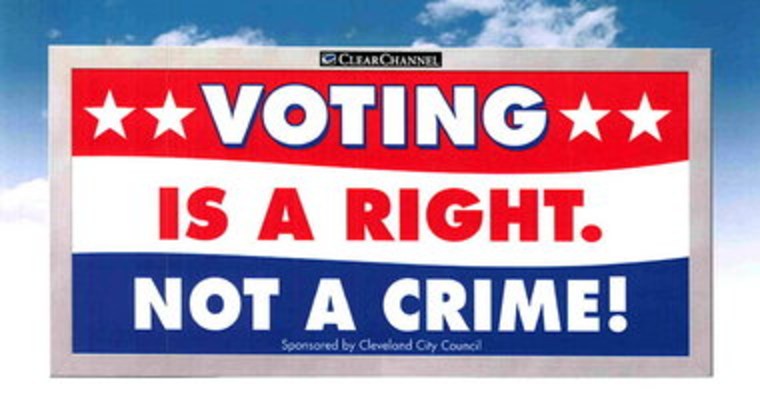After weeks of pressure, Clear Channel announced this weekend it will take down the anonymous voter fraud billboards that had been placed in minority communities in Wisconsin and Ohio, prompting concerns of voter intimidation from many activists. As those 140 or so billboards come down, another 15 billboards proclaiming that "Voting is a right, not a crime" will go up in the same neighborhoods in Cleveland. Pro-voting billboards will go up in Milwaukee too.
That decision from Clear Channel came just a day after Ohio Secretary of State Jon Husted said the court ruling reinstating early voting in Ohio was an "un-American approach to voting" at a symposium at the University of Toledo. Husted's argument, which focuses on the rights of states to set their own voting rules, is not new. It's an idea often used by opponents of the Voting Rights Act, including many Republican attorneys general. This "states' rights" argument has a disturbing connotation to anyone familiar with Civil War and Reconstruction era of Southern politics, and voting rights continue to be a racially-tinged issue today, especially in Ohio.
The federal court ruling on Ohio did not force local officials to extend early voting. Republicans had already done that, when they required the polling places to be open then for military voters. The ruling said that polling stations couldn't only allow servicemembers to vote on those days. If you were going to be open, you had to be open for everyone. After that ruling, Husted issued the blanket-standard requiring all polling places to be open during a uniform 16-hour period over those three days.
As Rev. Al Sharpton says, restricting voting access is what's un-American, not expanding it. That's an issue that most Americans understand on a fundamental level. That's part of why this photo has inspired so many people in recent days.
In it, World War II veteran Frank Tanabe is laying in his hospital bed, filling out his absentee ballot with the help of his daughter Barbara. A half million people saw the photo on the popular website Reddit.com. The comments included lines like "True Patriotism," and "This is America. Amen."
It would be interesting to hear if Husted thinks this photo of Tanabe is American or un-American, because it seems to have much more in common with the ruling he's so quick to decry than it does with his habit of limiting early voting. The ruling expanding early voting in Ohio helped level the playing field for everyone in the state, giving greater access to the people who need it most, the people who want to exercise a precious fundamental right in this country. There's nothing un-American about that.
